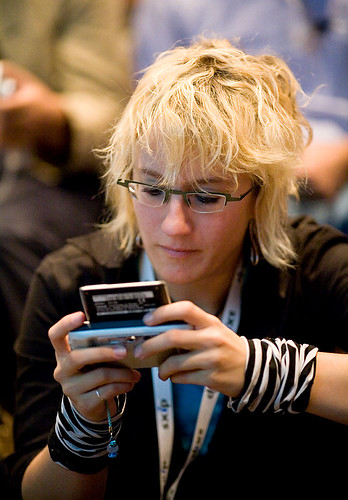 A couple of years ago i read Bill Mckibben’s book Enough. It’s a great read. In the book he discusses what it means to be human. There are 3 subjects he focuses on in the book: genetic research, nanotechnology and robotics. In each one he explores that ever shrinking moral and spiritual boundary. Eventually, we’ll get to an “enough point” where we should stop trying to push the limits of technology and medicine.
A couple of years ago i read Bill Mckibben’s book Enough. It’s a great read. In the book he discusses what it means to be human. There are 3 subjects he focuses on in the book: genetic research, nanotechnology and robotics. In each one he explores that ever shrinking moral and spiritual boundary. Eventually, we’ll get to an “enough point” where we should stop trying to push the limits of technology and medicine.
My favorite part is the discussion of genetically enhanced children and how science (and our ambition) continues to push the limits of what is possible and how children, in enhacned, will never be strive to be great or to achieve as pianists, painters, or athletes because of their “programming.”
I always like Mckibben’s summary of the state of affairs and the recognization of trends in society both on a cultural and technological level – and he does a great job here. Here, more than his others he looks at the family structure and how it has been altered due to television and he doesn’t paint a good picture…
So, in the last century, the invention of the car offered the freedom of mobility, at the cost of giving up the small, coherent physical universes most people had inhabited. The invention of radio and TV allowed the unlimited choices of a national or global culture, but undermined the local life that had long persisted; the old people in my small rural town can still recall when “visiting” was the evening pastime, and how swiftly it disappeared in the 1950’s when CBS and NBC arrived. The 60’s seemed to mark the final rounds of this endless liberation; the invention of divorce as a mass phenomenon made clear that family no longer carried the meaning we’d long assumed, that it could be discarded as the village has been discarded; the pill and the sexual revolution freed us from the formerly inherent burdens of sex, but also often reduced it to the merely “casual.”
…how all this has happened and what it means to us…
Whether all this was “good” or “bad” is an impossible question, and a pointless one. These changes came upon us like the weather; “we” “chose” them only in the broadest sense of the words. You may keep the TV in the closet, but you still live in a TV society. The possibility of divorce now hovers over every marriage, leaving it subtly different from what it would have been before. What’s important is that all these changes went in the same direction: they traded context for individual freedom. Maybe it’s been a worthwhile bargain; without it, we wouldn’t have the prosperity that marks life in the West, and all the things that prosperity implies. Longer life span, for instance; endless choice. But the costs have clearly been real, too: we’ve tried hard to fill the hole left when community disappeared, with “traditional values” and evangelical churches, with back-to-the-land communes and New Age rituals. but those frantic stirrings serve mostly to highlight our radical loneliness.
All of this makes me hate myself for loving the show Seinfeld, which is actually just a show exploring what it means to live a life that has no meaning. It is true, when i look around I see a world where there’s nothing but consumption – and when Mckibben points it out, I had to step back and let out a big whoa.
Where it all ends – the mindless consumption, the lack of context – is that we need to take a stand as individuals and produce context for ourselves. If genetic engineering takes place, the human race can lose the ability to be an individual and for each person to have meaning. If technology continues, we can continue to go beyond nature to a world that is completely unrecognizable. McKibben concludes that it is our capacity as humans for restraint-and even for finding great meaning in restraint. “We need to do an unlikely thing: We need to survey the world we now inhabit and proclaim it good. Good enough.”
As a lover of technology and change, the concept of “Good enough” is quite a thought. You should definitely read this book.





 My friend danah boyd gave a talk at the Etech conference last month
My friend danah boyd gave a talk at the Etech conference last month  Kierkegaard, the Danish philosopher fell in love with an attractive girl, Regine Olsen, and then he had concluded that they would be incompatible, that the love was mistaken, that he himself was so complex and she was simple, and he contrived to break the engagement so as to give the appearance that it was the young lady’s fault, not his.
Kierkegaard, the Danish philosopher fell in love with an attractive girl, Regine Olsen, and then he had concluded that they would be incompatible, that the love was mistaken, that he himself was so complex and she was simple, and he contrived to break the engagement so as to give the appearance that it was the young lady’s fault, not his. be mated to somebody, that solitude is a mistake. The inner voice doesn’t care about who you find. It just keeps pestering you, tormenting you – if you happen to be me – with homecoming queens first, then girls next door, and finally anybody who might be pleased to see you now and then at the dinner table and in bed on occasion. You look up from reading the newspaper and realize that no one loves you, and no one burns for you. The workings of nature are mysterious, but they do account for a certain amount of despair among single persons, the irrelevance you sometimes feel.
be mated to somebody, that solitude is a mistake. The inner voice doesn’t care about who you find. It just keeps pestering you, tormenting you – if you happen to be me – with homecoming queens first, then girls next door, and finally anybody who might be pleased to see you now and then at the dinner table and in bed on occasion. You look up from reading the newspaper and realize that no one loves you, and no one burns for you. The workings of nature are mysterious, but they do account for a certain amount of despair among single persons, the irrelevance you sometimes feel.
 He recently ran 50 marathons in 50 days (age 44). He ran 350 miles without sleeping (over 3 days). He ran the only marathon to the South Pole. The list goes on and on. The guy is awesome.
He recently ran 50 marathons in 50 days (age 44). He ran 350 miles without sleeping (over 3 days). He ran the only marathon to the South Pole. The list goes on and on. The guy is awesome.
 “Keep in mind Brian McBride is playing with titanium plates in his face.” John Harkes discussing McBride’s condition while the states were playing World Cup champion Italy. McBride broke his face in the first game when the US lost a shocker to Poland and then with a lot of grit and heart they tied the eventual champs 1-1.
“Keep in mind Brian McBride is playing with titanium plates in his face.” John Harkes discussing McBride’s condition while the states were playing World Cup champion Italy. McBride broke his face in the first game when the US lost a shocker to Poland and then with a lot of grit and heart they tied the eventual champs 1-1. e.
e. I just saw The Prestige and while not the best movie of the year, it is really really good. I’m going 8 out of 10. It man be too slick and not the best written, but it is captivating and completely enjoyable. Not because of the magic (which i thought was really cool) but because of the rivalry between Hugh Jackman and Christian Bale and their obsession to being the best in London.
I just saw The Prestige and while not the best movie of the year, it is really really good. I’m going 8 out of 10. It man be too slick and not the best written, but it is captivating and completely enjoyable. Not because of the magic (which i thought was really cool) but because of the rivalry between Hugh Jackman and Christian Bale and their obsession to being the best in London. The film also does a great job of juggling between the Victorian age and industrial revolution, traditional actors (Caine) and rockstars (David Bowie), traditional film (analog) and modern techniques (digital), and most importantly between true the illusions of magic and actual science and innovation. Also, no one seems to be talking about the true rivalry to come out of this one. Do you think it’s too early to begin talking about a Wolverine vs. Batman film?
The film also does a great job of juggling between the Victorian age and industrial revolution, traditional actors (Caine) and rockstars (David Bowie), traditional film (analog) and modern techniques (digital), and most importantly between true the illusions of magic and actual science and innovation. Also, no one seems to be talking about the true rivalry to come out of this one. Do you think it’s too early to begin talking about a Wolverine vs. Batman film?